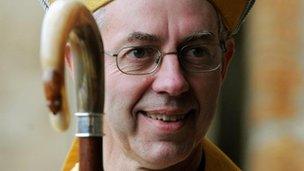Archbishop of Canterbury Justin Welby: World reaction
- Published

The Archbishop of Canterbury is the spiritual leader of the 80 million-strong Anglican Communion
Anglicans around the world have been responding to the appointment of the Right Reverend Justin Welby as the next Archbishop of Canterbury.
The 56-year-old Bishop of Durham replaces Rowan Williams, who steps down in December after 10 years in the post.
The Archbishop of Canterbury is the spiritual leader of the 80 million-strong Anglican Communion - with communities in in 165 countries.
Here is a selection of responses from the global Anglican Church:
Nigeria - By Will Ross in Lagos
If Bishop Welby wants a frank report card on the state of the Anglican Church he can get it from Bishop Nicholas Okoh, the Primate of the Church of Nigeria.
He described it as "grievously disunited" and said attending church meetings was like "working in a police state with agents all over the place trying to catch people with their words".
The Anglican Church says it has some 18 million followers in Nigeria and the new Archbishop of Canterbury will have to tread very carefully on the controversial issues of homosexual priests and same-sex marriage if he wants to ensure rifts do not deepen further.
"Handle with care" seems to be the Nigerian warning: Moves to allow these would not be accepted here and would further increase the possibility of liberals and conservatives formally splitting.
There does, however, appear to be a growing acceptance here that the ordination of women bishops is inevitable.
Malawi - By Raphael Tenthani in Blantyre
Malawi's one million Anglicans have welcomed the appointment.
"It's exciting news for Anglicans in Malawi," said Bishop Brighton Malasa of Upper Shire, the chairman of the Anglican Church in Malawi.
"I have interacted with the Most Reverend and Right Honourable Justin Welby personally; he is a good man, a humble person, so cool, I think he himself must be most humbled by this appointment."
"Others are calling it 'risk taking' to have such a fresh face to head the global church but that's how God works," the bishop told the BBC in a telephone interview from his base in the eastern district of Zomba.
He said the new Archbishop of Canterbury would have to grapple with challenges including the controversy surrounding the ordination of homosexual men and women bishops in the Church, Malawi's third largest Christian community after Catholics and Presbyterians.
Malawi has some of the world's harshest laws against homosexuality, with "unnatural acts, gross indecency and carnal knowledge against the order of nature" laws carrying maximum prison sentences of 14 years.
Malawi's Anglicans were divided when a pro-gay rights British bishop, Nicholas Henderson, was appointed to head a diocese in the largely conservative southern African country. His appointment was reversed after protracted protests.
Kenya - By David Okwembah in Nairobi
The head of the Anglican Church in Kenya, Archbishop Eliud Wabukala, welcomed Bishop Welby's appointment, saying he would take the Church back to the teachings of the Bible.
The Kenyan Church was among those opposed to the ordination of the gay bishops, joining other Anglican congregations in threatening to withdraw from the mother Church.
Biblical teachings were clear on what union the Church should celebrate, said Archbishop Wabukala.
"He's a man I know well having worked together with him when I was the bishop for Bungoma in setting up development projects," he said.
One Anglican adherent wondered why the Church had overlooked the Archbishop of York Dr John Sentamu, who hails from neighbouring Uganda and for whom many in Kenya had been rooting.
But some Kenyans did not seem to know the new head of the Church - including some working at the Anglican secretariat in Nairobi. Many of them wanted to know the position of the new head of the Church on the ordination of gay bishops and same-sex marriage.
United States - By Jane Little in Washington
The appointment of Justin Welby has been welcomed by the American Episcopal church.
The 105th Archbishop of Canterbury has his work cut out to heal the bitter divisions in the global Anglican Communion, which are nowhere more apparent than over the fraught issue of homosexuality.
It was its election of Gene Robinson - an openly gay man - as the Bishop of New Hampshire in 2003, that prompted the crisis in the Anglican Communion.
Bishop Robinson, who is to retire early, in 2013, citing the pressure of the backlash against him (which has included death threats), called Justin Welby an "immensely likeable and sensible man".
He added that it showed the Church of England was "thinking outside the box, which is exactly what is needed, and it would be a breath of fresh air for the Anglican Communion".
The leader of America's two million Episcopalians, the Most Reverend Katharine Jefferts Schori, also welcomed the move.
"I give thanks for his appointment and his willingness to accept this work in which I know his gifts of reconciliation and discernment will be abundantly tested," she said.
The American Church itself will be calling on Justin Welby's apparent gifts as a mediator.
Three years ago, North American traditionalists broke away from the US Episcopal church to set up their own network under the authority of the Anglican Church in Nigeria.
There have been lawsuits in US dioceses over church property, and much recrimination.
Bishop Julian Dobbs of the traditionalist Convocation of Anglicans in North America, said he was "excited" by Justin Welby's experience and engagement with the church in Nigeria.
And in a nod to aspirations to be recognised as an independent Anglican Church in the US, he added that he "would welcome dialogue with him with regard to our place in the communion".